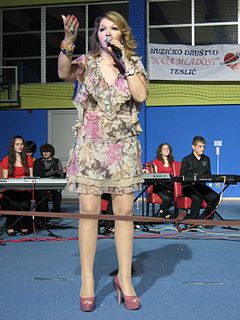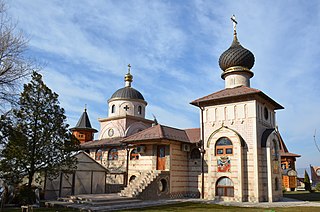Željko "Žeki" Šašić is a Serbian turbo-folk singer. In late 2013, he had competed in the first season of the Serbian version of Your Face Sounds Familiar. After the 12 weeks, he claimed 7th place, but was a public favourite with a wide spectre of enjoyed performances as Aca Lukas, Bijelo Dugme, Riblja Čorba, Snežana Babić Sneki and many more.

Lokve is a village in Serbia. It is situated in the Alibunar municipality, in the South Banat District, Vojvodina province. The village has a Romanian ethnic majority (90.85%) and a population of 2,002 people. More than half of population of Lokve lives abroad, mainly in USA and Switzerland.

Neda Ukraden is a Serbian pop singer born in Croatia, grew up in Bosnia and Herzegovina and is currently living in Serbia. Her professional career stretches back to 1967.
The Prebilovci massacre was an atrocity perpetrated by the Croatian Ustaše in the Independent State of Croatia during the World War II persecution of Serbs. On 6 August 1941, the Ustaša killed around 600 women and children from the village of Prebilovci, Herzegovina, by throwing them alive into the Golubinka pit, near Šurmanci.
Ksenija Pajčin was a Serbian singer, dancer and model popular in Serbia and the other former Yugoslav republics. Sometimes referred to as Xenia or Ksenia, she was known for her sometimes sexually appealing image on stage.

The Church of the Holy Salvation is a Pre-Romanesque church in Split-Dalmatia County, Croatia. The exact location of the church is in a small village of Cetina, in inland of Dalmatian Zagora, on spring of river Cetina, 8 km northwest from the town of Vrlika.

Darkovce is a village in the municipality of Crna Trava, Serbia. According to the 2002 census, the village has a population of 205 people.

Turekovac is a town in the municipality of Leskovac, Serbia. According to the 2002 census, the town has a population of 1794 people.

Gornje Vodičevo is a village in the municipality of Novi Grad, Republika Srpska, Bosnia and Herzegovina. It consists of twenty hamlets; among them are Kukavice, Vukovići, Kestenova Dolina, Bundale, Rekići, Potok, Žljeba, Šurlani (Stanići), Kolundžije, and Đurđevići-Zecovi.

Šapine is a village in the municipality of Malo Crniće, Serbia. According to the 2002 census, the village has a population of 1064 people.

Morića Han is a han originally built in 1551 in Sarajevo, Ottoman Empire. After a fire in 1697 it was reconstructed in its current form. Morića Han is one of the buildings which were financed by and belonged to Gazi Husrev-Beg's endowment (Vakuf). It is the only surviving han in Sarajevo. It is located in Baščaršija, Sarači street, in Stari Grad.

Donja Mutnica is a village in Serbia. It is located in the municipality of Paraćin and Pomoravlje District. According to 2002 census it had 1051 inhabitants which is significant drop from 1991 census when 1373 inhabitants were registered.
NK Jedinstvo Omladinac is a Croatian football club based in the village of Nedešćina.

Ademaga Mešić or Adem Aga Mešić was a Bosnian politician and military officer who served in the Austro-Hungarian Schutzkorps, and later a member of the Ustaše government of the Independent State of Croatia for Bosnian region during World War II.
Dugali Ahmed or Ahmed-paša Dugalić was an Ottoman governor of the Bosnia Eyalet and Temeşvar Eyalet (1605–?).
Jakup Ferri or Feri was a leader of Albanian irregulars from Plav and member of the nationalist Albanian League of Prizren. Together with many other fighters from Gjakova, they assassinated the Ottoman leader Mehmet Ali Pasha in 1878. He led the pro-Ottoman irregulars from Plav in 1879 in the Battle of Novšiće against Montenegrin forces, and was killed in the battle.
Bonifacio Destefanis, O.F.M. was a Roman Catholic prelate who served as Bishop of Ston (1564–1582).

Zar je važno da l' se peva ili pjeva... World Tour is the fifth headlining concert tour by Serbian singer Lepa Brena, in support of her eighteenth studio album, Zar je važno dal se peva ili pjeva (2018). The tour is set to begin on 11 November 2017, in Vienna, Austria, at the Lugner City. The tour was also included some festival concerts.
The Bookocide in Croatia or Libricide or Bibliocide or Culturecide was the destruction of the books and book burning in the Republic of Croatia in period 1990—2010. The bookocide began in 1990, shortly before the Croatian War of Independence and lasted during the first 19 years after Croatia became independent in 1991. All destroyed books had one of following things in common, they were written on Serbian Cyrillic or ekavian dialect or published by non Croatian publishers and particularly ideological literature. The destroyed books were estimated to be around 13,8% of all books in libraries in Croatia.
The Moving of the Serbian industry to western Yugoslav republics was a strategy of the government of the Socialist Federal Republic of Yugoslavia to conduct massive transfer of industrial plants, machinery, technology and experts from Serbia to the western republics of Yugoslavia in the Informbiro period (1948—52) and shortly after it. In some cases, only parts of industrial plants were moved while in others the whole factories were dismounted and transported out of Serbia. Since the ratio of highly educated people was very low at that time, moving experts out of Serbia had substantial negative consequences for its future development.













